Travelers' Century Club: Meeting the world's most-travelled people
- Published
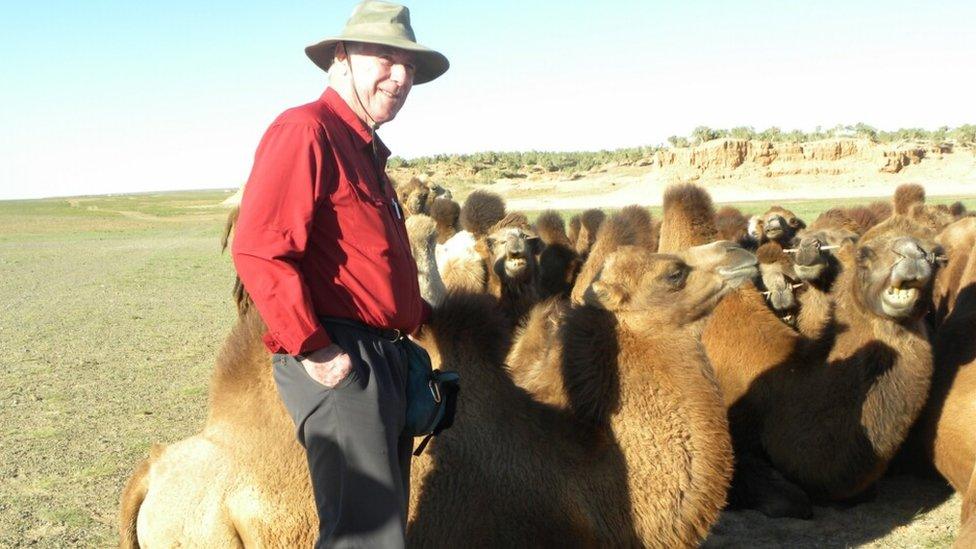
TCC member Terry Wharton in the Gobi Desert, Mongolia
The Travelers' Century Club is home to the world's most-travelled people - so what keeps them going?
Bill Ashley is 79, but still remembers his first geography lesson.
He was in fourth grade in 1940s North Carolina. Most of the pupils were "bored or asleep".
Bill was different. "I sat there, so excited," he says. "I wanted to visit those places."
It was easier said than done.
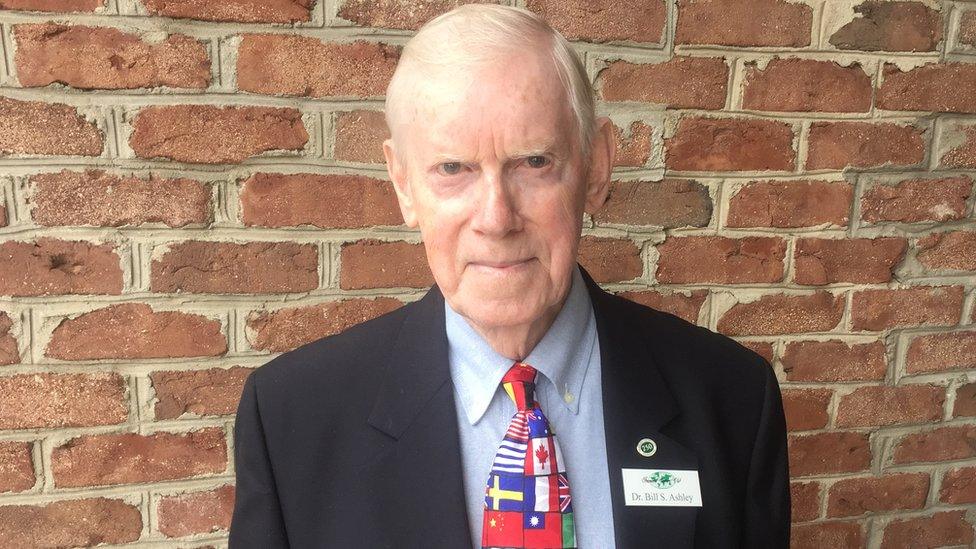
Dr Bill Ashley - and his "flags of the world" tie
Bill's family was poor. They lived on a tobacco farm, in a small house with no electricity. Water came from a nearby spring.
When he said he wanted to go to college, his parents said they couldn't afford it.
Thanks to a scholarship - and a summer job picking tobacco - he made it. Bill became a teacher and, in the summer of 1962, finally went abroad.
It was 15 years since that geography lesson.
The trip - paid for with a $600 bank loan - took him across Europe, from London to the Leaning Tower of Pisa. Since then, he has been to almost every country in the world.
Bill caught the travel bug in a North Carolina classroom. Seventy years later, there's no sign of a cure.
To join the Travelers' Century Club (a non-profit group) you must have been to at least 100 countries or territories. Bill has been to 259 of the 325 places on the TCC list., external
His highlights include Table Mountain, balloon rides over Kenya, and being at "18,000ft over Kashmir". It's an incredible feat for a retired teacher.
"It's where your priorities are," he says. "Some people have to get a car every two years. I just got rid of mine April, and it was 34 years old.
"I save my money to travel. I don't have to go to Starbucks every morning and have a $4 cup of coffee."
Next year he's going to the North Pole; before then he's heading to Colombia.
Territory 260 is likely to be San Andres and Providencia, a Colombian archipelago in the Caribbean.
"My friend and I are going to fly up there from Cartagena so I can check it off," he says.
So does he keep travelling to see new places? Or to tick things off a list?
"It's a little bit of both," he admits.
The TCC says some people join the club for "bragging rights", but its slogan is more noble: "World travel: the passport to peace through understanding."
Bill is sure that travel has global benefits, as well as personal.
"The whole thing is to try to feel like you're leaving the world in a better place than you found it," he says.
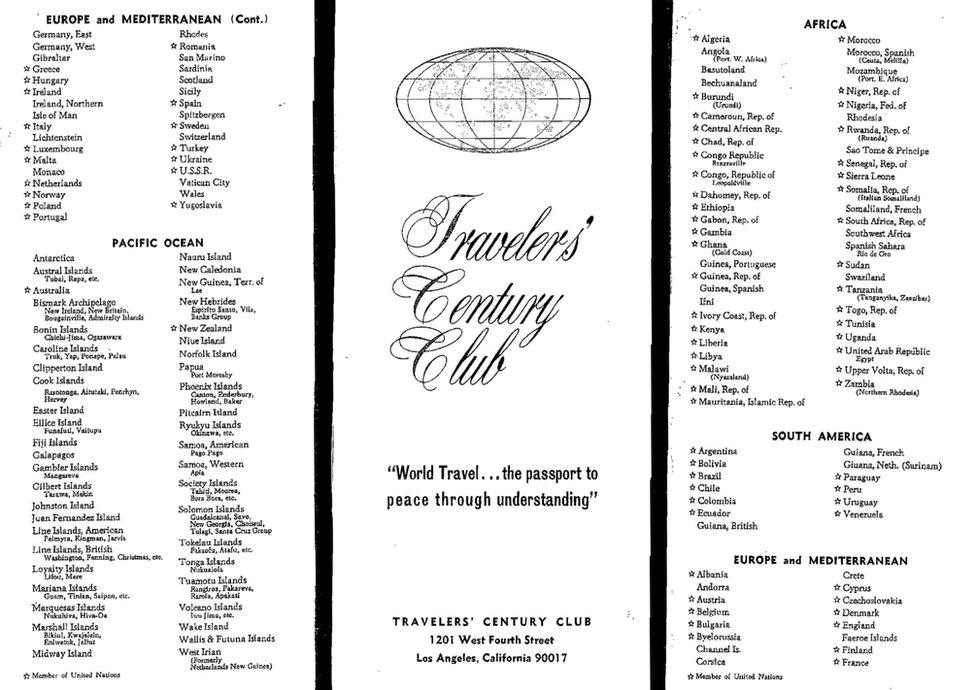
A TCC country list from November 1965
To finish the TCC list, you have to visit places that are remote, or dangerous, or both.
Terry Wharton is a 79-year-old from Derbyshire, England, who has lived in the US since 1963. He has been to 312 places, including Afghanistan (five years ago) and Iraq (seven years ago).
"It was triple security to get into the hotel in Kabul - it's where the journalists stay," he says.
"My girlfriend took photos as we went through. The security went bananas."
Terry and his partner were able to walk freely round Kabul, but in Iraq their group of four needed protection.
"We had a driver, a guard, and a bodyguard - and he was packing heat [carrying guns]," he says.
Their trip included Baghdad ("the Minister of the Interior took a personal interest - they opened a museum for a special visit") and Kurdistan ("super safe - we walked round there").
They also went south to Basra, where British troops were based after the 2003 invasion.
"That was probably the least safe area," says Terry. "We travelled in a van - they drew the drapes when we got into occupied areas."
It sounds exciting, but also - shall we say - a touch scary.
"It was wonderful," replies Terry. "I trust the company who organised the trip. They know a lot of detail."
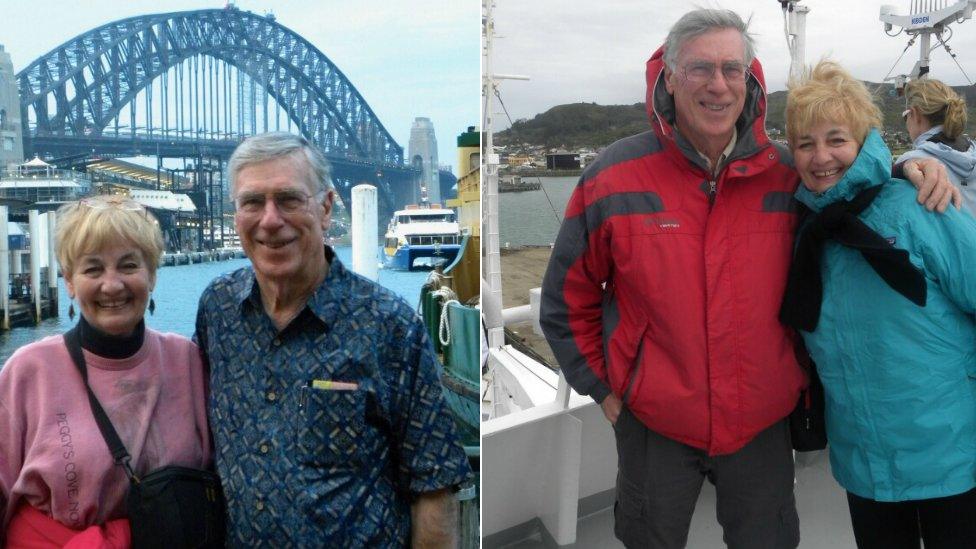
Terry Wharton in Sydney (left) and en route to the New Zealand Sub-Antarctic Islands
The 13 places left on Terry's list include Fernando de Noronha, an archipelago 220 miles off the coast of Brazil, the Juan Fernandez Islands, 400 miles off Chile, and the British Indian Ocean Territory.
Sadly for Terry, unless you're in the military, the BIOT - a base for American forces - is almost impossible to reach.
There are stories of travellers hiring yachts, sailing nearby, then calling a fake SOS to get taken ashore.
"I met a guy in South Sudan - we were there when it first became a country," remembers Terry. "He was really upset when I said I was from England: 'You bastards!'
"His last place (on the list) was Diego Garcia (the main island in the BIOT)."
Terry doesn't know whether he'll finish the 325 - not least because he's having both knees replaced two days after this interview - but his eyes dance at the possibility.
"When I'm doing new countries, I get a real thrill," he says. "I think: 'I made it'."

The TCC list: Some of the remotest places
Cocos Islands (Australian territory in the Indian Ocean)
Norwegian Antarctic
Pitcairn Island (a British island in the South Pacific)
Wake Island (a remote Pacific island administered by the US)

The Travelers' Century Club has members all over the world, with chapters (branches) in the US, Canada, Germany and the United Kingdom.
The Washington DC chapter meets in the back room of a restaurant in nearby Virginia. More than 20 members turn up to swap stories, share tips, and see friends old and new.
Listening to the chatter is like leafing through an atlas - a Lord Howe Island here; a Queen Maud Land there.
Jorie Roberts, a 62-year-old tax lawyer from the US Virgin Islands, has been to 157 places on the TCC list. She grew up in Alabama and, like Bill Ashley, didn't travel abroad as a child.
When she was 17, a teacher led a summer trip to Europe - London, Dijon, Geneva, Rome - and she has "travelled ever since".
Like many members , Jorie disproves the "box-ticking" theory by revisiting favourite places. She has, for example, been to Iran twice and Cuba four times.
"We met a photographer who lived with Che and Fidel in the late 50s in the mountains," she says. "He had all sorts of pictures of them in hammocks with cigars. It was fascinating."
For Scott Talan, another TCC member, finding places he likes is the whole point.
"Before I knew about the Travelers' Century Club, my real thinking was 'go to enough places, find the ones you really like, that move you, that you want to return to'," he says.
"For example, Kyoto (in Japan) - I've already been there four times. I went to Laos, Luang Prabang, and didn't check my watch for four days. I want to go back there."
Scott was the mayor of a town in California aged 30, became a television journalist, and is now an assistant professor at American University in Washington DC.
"I learn about people and places [through travel]," he says.
"When a student from, say, Indonesia is in my class, and I can say I've been there, there's an immediate connection."
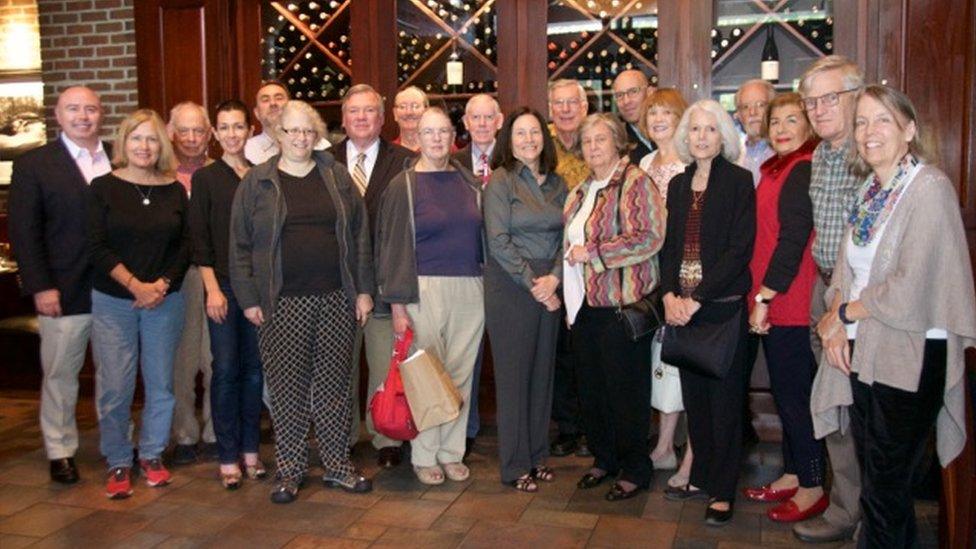
The Washington DC branch of the TCC in Virginia
Jeffrey Houle, a partner with law firm DLA Piper, is the area co-ordinator for the DC branch. He has been to 151 places on the TCC list, covering every continent bar Antarctica.
"Making the world a better place is all about making connections," the 52-year-old says.
"We're all human beings - the more connections you make across cultures, across countries, across continents, that builds understanding."
As the meeting ends, Jeffrey hands out copies of interesting articles. Some are about air miles; others are about hard-to-reach places.
One of them is about Elon Musk's plans for space travel. Bill Ashley smiles and takes a copy. For now, package holidays to the Moon seem unlikely.
But so, in a classroom in 1940s North Carolina, did Bill's chances of seeing every corner of the Earth.
- Published29 September 2017

- Published17 March 2017
